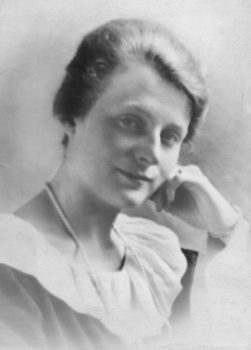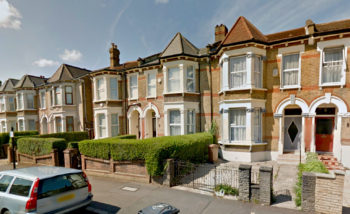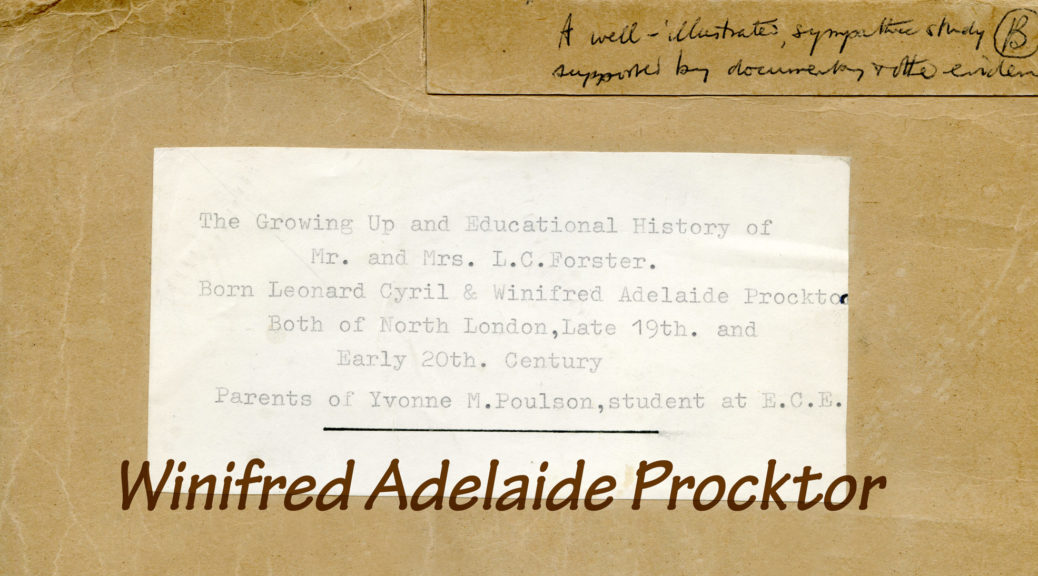
I provided an overview of my mother’s social history of her parents for teacher training college in a separate post. This is the detail section for her mother, Winifred Adelaide Procktor. I scanned and converted into text (production note: OCR software is still sadly an almost-success where fixing up errors almost negates the time saved) to improve readability, but the spellings (English versus US) and rather odd sentence structure – more like notes than an essay – I left intact. You’re seeing what my mother turned in – it surprised me to see such ragged work, but possibly she was pushed for time given other coursework.
Narrative of Winifred Adelaide Procktor’s life and family – my mother
Winnie was thrown aside as dead on Feb. 21st. 1898 and all attention paid to her mother Janie who had had a long and difficult labour, possibly due to the after effects of spinal curvature for which she had had to spend periods of her childhood lying strapped to boards. But Winnie was not giving up that easily and soon it was noticed that the bundle was trying to move and cry. She received attention and is still alive and talking, but still a lone fighter knowing little physical or emotional content. She had great trouble memorising, which would presumably now have been regarded as the after effects of blue asphyxia. She was the first child of Will Procktor, son of Quaker pioneers in Canada who had returned to this country when their son was 12 years old; giving him two years organised education at a board school whence he started work in an American ‘Trading office, J.G.Rollins and Co., in the City of London. Will was born in 1868 and his was learning by experience plus the Bible and discussions among the Society of Friends. He broke away from the Quaker movement and joined a group of young, nonconformist Christians concerned with social work -The Hoxton Christian Institute – where he met Janie Ford (b.1871), an upright young lady on the fringe of society with a lovely singing voice which she had been invited, to use at court on occasion, but who was interested in social reform, and had been trained as a teacher, main maths.

Will and Janie had two other children; William Herbert (Bert) born when Winnie was 7 years old, and Hilda Mary when she was 9 years old. At the age of 6 Winnie went to a local private school for young ladies run by three spinsters. She had previously been taught deportment by her maternal grandmother, before said grandmother succumbed to early senile decay, and her mother had taught her singing and elocution from the cradle. When 10 she went as a paying pupil to the Skinners Guild school and at 12 sat the all England scholarship from endowed schools. There were only comparatively few entrants as few parents of paying pupils had sufficiently low incomes to be eligible. She won a place at Christ’s Hospital Hertford, but found it difficult to adjust to a strict C. of E. boarding school coming from a family of extreme individualists.
She worried inordinately about her mother as Will spent more money on books and social gatherings than on household conveniences. She missed her maternal Grandfather who had been more to her than her own father; he had spoiled her a little, taken her about with him when visiting houses and building sites on business, and always driven home via one of the parks. A lively personality who had struggled successfully with a love of the bottle and studied surveying and architecture at the newly instituted night schools. He joined his illegitimate brother’s firm of speculative builders as the brains to pair with the brother’s financial direction. (Night school too was what engaged all Wynne’s father’s energies, though without much visible financial reward)
Another point of difficulty at Christ’s Hospital was that the Bishop of Exeter was the brother of the headmistress, so Miss Robertson looked unfavourably upon non-conformists. As this particular child was a trained singer she was eligible for free musical tuition and required to lead the singing on religious occasions, in spite of the parents request that she be excused religious instruction. She was not permitted to sing the solos however, lest she should suffer from a swollen head. After an average performance at school to the age of 17 in the spring holidays of 1915 she met Leonard C. Forster at the Abney Brotherhood to whom she wrote as her friend El-Sie and who bred a certain discontent at the idea of staying at school and going to domestic science college. During the autumn term there was a heavy zeppelin raid on Hertford (mistaken for an industrial town by the Germans) and this, coupled with repeated appeals to women to step forward, take a man’s job and release him to go to the front confirmed her intention to leave and take a job. Through a cousin who was a secretary in an insurance company she started work in the accounts dept. of the Union Assurance Co. whose buildings are opposite the Royal Exchange. She continued her singing training under an ex-Royal Academy professor-a worman-until her marriage in 1922. In 1929 she had a daughter and in 1934 after her husband had started being ill and it had been advised that her daughter should be sent away to a Montessori kindergarten boarding as she was showing signs of emotional disturbance. Wynne determined to learn the causes of the trouble by going to a course of University of London extension lectures on Psychology. After six months her husband’s illness became too severe again for her to continue in any way except reading. She learnt to ride with her daughter.
In 1938 the family moved to Harpenden, Hertfordshire, so that the daughter might go to St. Georges Co-educational school as a day-pupil. This school had a very active parents association through which the parents could discuss their children’s progress thoroughly with the staff. The school’s music under Douglas and Muriel Dawn from Yorkshire flourished with choir and orchestra and overflowed into the Harpenden ladies choir; she and her husband were encouraged by this incentive to improve their techniques.
When the daughter left school to study drama in London, mother followed and joined a group about which she had learned from a much travelled member of the staff of Rothampstead Agricultural Research Station at Harpenden. They were disciples of Gurdjeff, an Armenian Christian philosopher whose ideas are expounded in Ouspensky’s ‘In search of a Miracle’ and led by a Mr. Bennett who gave lectures in Vauxhall Bridge Road. In order to be able to practise his disciplines in community it was necessary to go to the society’s H.Q. in Kingston.
Also she joined Lloyd’s choir and passed an audition for the B.B.C. Choral Society. She had become a life member of the C.H. O.G.A. (Christ’s Hospital Old Girls Association) on leaving school, kept in regular contact with those from her own house, and appeared as Nell Gwyn in the C.H. 400th. anniversary musical play at the Fortune Theatre.
In 1955 she became a Roman Catholic which involved study for instruction and attending lectures prepared by the Jesuits for eager enquirers from within and without the faith at Parra Street church near Grosvenor Square.
She left London to retire to Worthing in 1957 with much regret.
She joined the Worthing Municipal Choir, The Chichester Singers (attached to W. Sussex Education Dept. – introduced by a local music teacher in the other choir). In 1966 she attended lectures arranged by the Worker’s Educational Association at the Adult Education Centre in Worthing; a course in child development (much of the same reading as the University lectures in 1934); a course in psychology and Christianity and a course in astronomy; the same group went to Herstmonceaux and Moreley college planetarium; and to a Dolmetsch concert at Hazlemere.

